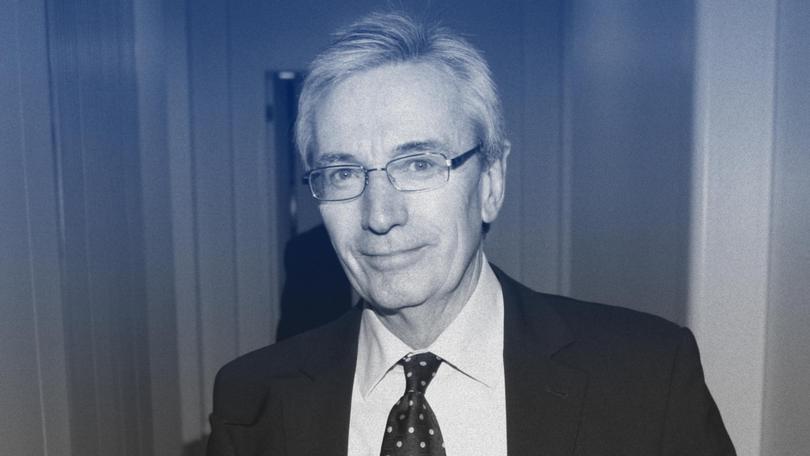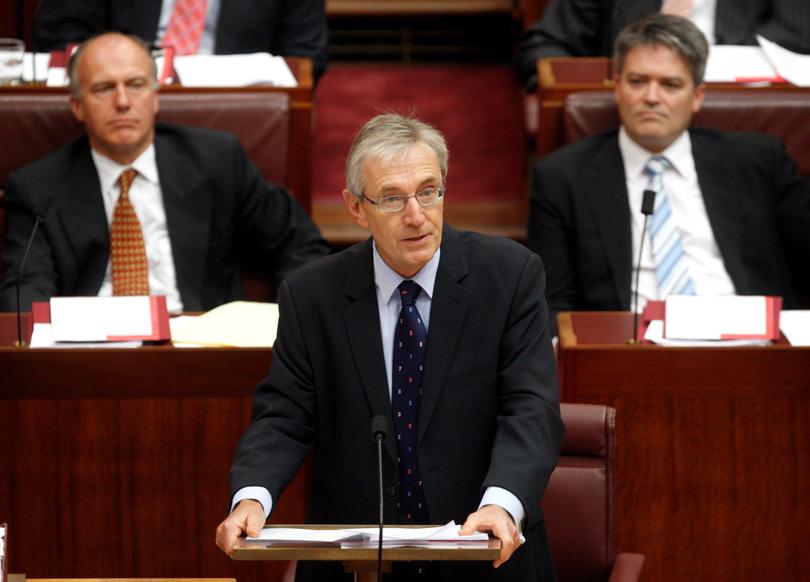Powerbroker Nick Minchin on Liberals: Face reality of modern Australia and stop the ‘crazy stuff’
One of the Liberal party’s most conservative powerbrokers has dropped his total opposition to quotas and urged the party to come up with policies that appeal to modern society

One of the Liberal party’s most conservative powerbrokers, Nick Minchin, has dropped his total opposition to quotas and urged the party to come up with policies that appeal to modern society instead of 1950s Australia.
Mr Minchin, who served as Finance Minister in the Howard government, said the party needed to “come to grips” with the country’s modern outlook.
He said the Liberals not only needed to include more women but also offer policies that appealed to modern families, citing the proposed ban on public servants working from home as “crazy stuff”.
Sign up to The Nightly's newsletters.
Get the first look at the digital newspaper, curated daily stories and breaking headlines delivered to your inbox.
By continuing you agree to our Terms and Privacy Policy.Former leader Peter Dutton was forced to jettison the policy in the second week of the election campaign because it was so unpopular, particuarly with women.
Mr Minchin said it should never have seen daylight in the first place.
“I’ve got three adult children, they all work from home two days a week,” he said.
“How on earth could the party come out and say ‘you’re going to go back to work five days a week?’”
“It’s just crazy stuff, you’ve got to start with what is the reality of modern-day Australians.”
He said the Liberal party’s challenge was to find policies that represented party values but recognised the role of working women and the fact that 30 per cent of Australians are born overseas.
“What are the realities in modern Australia and how do we develop policies consistent with our values that will be appealing to that Australia, not the Australia in the 1950s,” the 72-year-old said.

Mr Minchin, a former state director in South Australia, began working for the Liberal party in 1977. He became a Senator in 1993 and became leader of the right faction.
He served as a cabinet minister for almost a decade and retired from parliament in 2011 when the Coalition was in opposition. He has since served as Consul-General for Australia in New York and remains one of the Liberal Party’s most respected elders.
Speaking exclusively to The Nightly following Peter Dutton’s wipeout election result on May 3, in which the Liberal party was reduced to its lowest-ever representation in the federal parliament, he said the party should not be written off but did need to reform.
He dropped his lifelong opposition to quotas, saying they should be reconsidered if it were demonstrated they would make a difference in attracting women voters.
“If you believe in picking on merit then quotas are an anathema,” he said.
“However, I think it is proper after an election like this to reexamine that question.
“We’ve clearly got a problem with the female vote.
“Would having more and better female candidates than members make a difference?
“I mean, that begs the question — is the female vote a function of not having enough women?
“You’ve got to be satisfied that that is the problem, and then clearly if it is, then we really have to think hard about looking at the issue?
“Because we can’t win without our fair share of the female vote and clearly there is a big problem, so I think it does have to be looked at again.”
He said a less formal quota or an A-list like the one introduced by former UK Prime Minister David Cameron, who modernised the Tory party and made them re-electable, could be one option for the Liberals.
This week, the party elected their first woman leader in Sussan Ley.
Ms Ley, the former deputy leader, has previously called for targets to increase women MPs in the Coalition.
Asked at her first news conference as leader if she still supported quotas, she said the party needed more women candidates but stopped short of saying she would guarantee their introduction.
“I will certainly re-engage with all those different organisations within our party to absolutely understand how we can improve that trajectory of women,” Ms Ley said.
Redbridge polling shows that by the time of the election, Mr Dutton had a net favourability with women voters of minus 25 compared to minus 2 for Prime Minister Anthony Albanese.
The Liberal Party room comprises 19 women compared to 35 men amongst their lower house and Senate ranks.
By contrast, 57 per cent of Labor’s members and senators are women, smashing their goal set almost a decade ago, that 50 per cent of candidates to be preselected by 2025 would be women.
Dutton should not have been campaign director
Mr Minchin also said the campaign had gone wrong for the opposition because lessons of past campaigns had still not been learned, including the federal leader taking too much control instead of leaving the campaign to the federal director.
Relations between the Coalition campaign headquarters, led by federal director Andrew Hirst, and Mr Dutton and his travelling party were more disconnected compared to relations in prior campaigns.
Mr Dutton ran a command and control style of leadership and kept a tight, small circle of trust led by his chief of staff, Alex Dalgleish, who had no experience running a campaign. Mr Dutton also installed his close friend, former MP Jamie Briggs, in campaign headquarters who acted as a “Dutton whisperer”. This role was unprecedented.
Mr Dutton’s travelling party often made key decisions on the fly.
“One of the repeated errors we make, and it seems to have been made again in this campaign, is allowing the leader of the parliamentary party to be the campaign director,” Mr Minchin said.
“It seems to me that Dutton was allowed to be the campaign director and that is always disastrous.
“I’ve been raving on about this for 30 years.
“You must never let the leader run the campaign.
“When I was state director and deputy federal director, you’ve gotta have the balls to stand up to the leader and say, ‘listen mate, I’ve heard you but we’re not doing that okay?’”
The former South Australian Senator said the campaign review must be hard and objective, but scotched suggestions that the Liberals were facing an “existential crisis”.
“We still have a lot of problems that have been identified over the years and just haven’t been fixed — we’re going to have to try again,” he said.
“But boy this was a wake-up call, it’s really now quite urgent.
However, he said the party was not about to disappear.
“It is still is well-resourced and still got plenty of members,” he said.
“It’s still got a core 30 per cent of the vote – much the same as the Labor party.”

